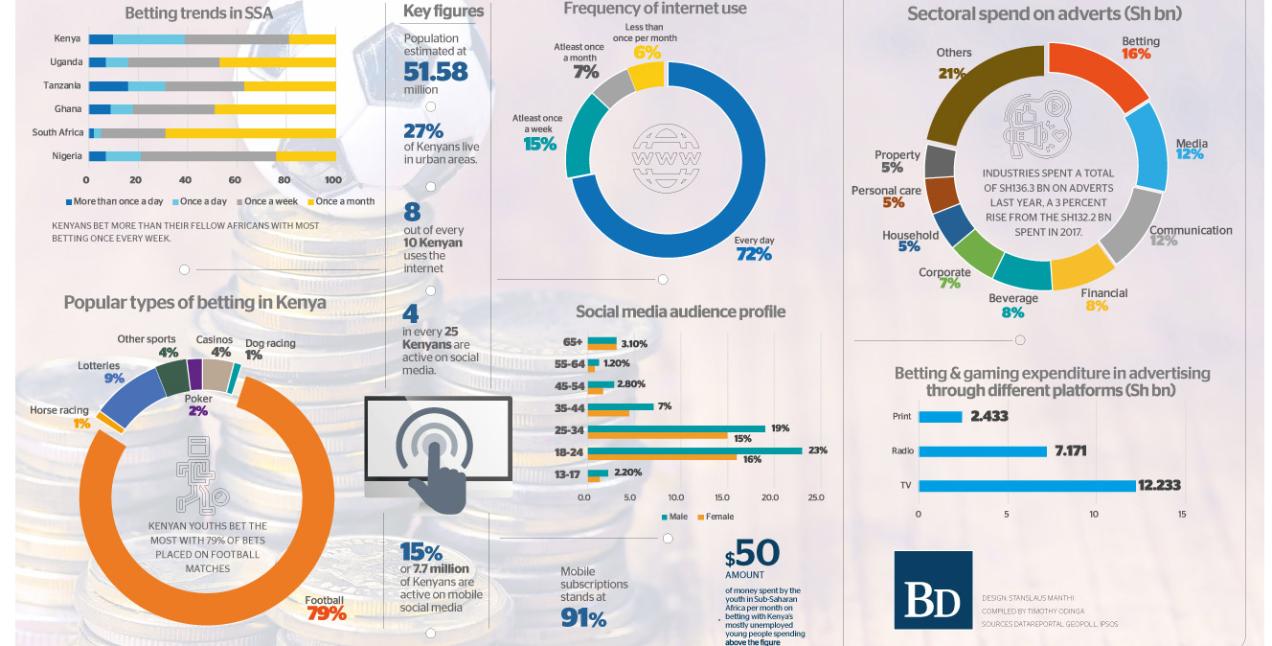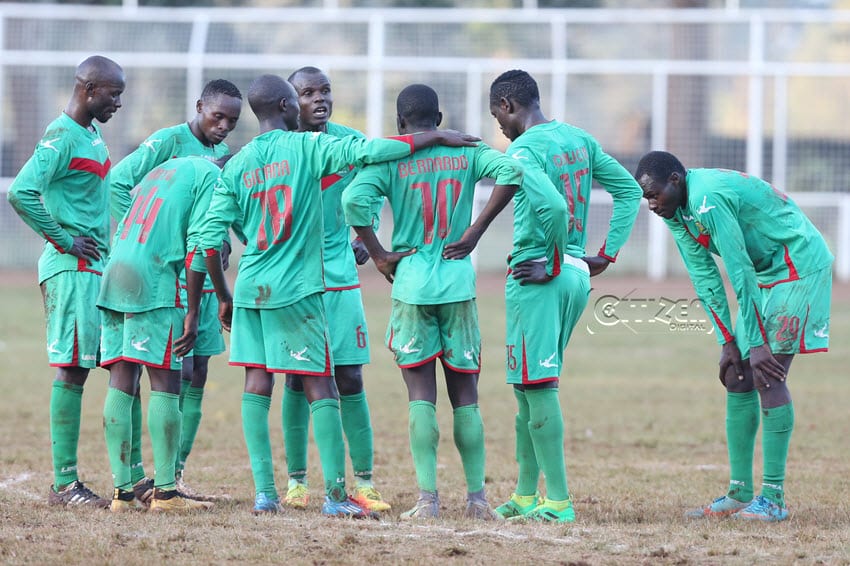Let me take on the high stool of morality and attempt to take on the not so new ‘evil’ in football and the sporting world. Okay, maybe I will pull up a seat and express my opinion on an issue I feel strongly about – betting or gambling and sports, or sports betting. I felt the need to express my view on this issue following a visit to my home country, Kenya, more than five years ago. Update: I was previously based in Geneva, Switzerland but I have since relocated back to Nairobi, Kenya.
After almost ten years away from home, I was always looking forward to the trips back to the motherland. Usually, this was a once a year affair unless someone was getting married, then I did not mind making an extra trip to queue for some of that pilau. Either that or I hit the jackpot somewhere along the year, though the odds were almost always stuck against me. I always looked forward to seeing my family and friends, who had over the years been reduced to WhatsApp chats/groups, Tweeps and Facebook updates/comments. It’s hard to imagine life without these great innovations sometimes!
The Sharing Economy
Well on this particular trip home, on my taxi – sorry Uber – on my Uber ride from the airport I tried to make a new friend, my driver Kevin. I am not very good at small talk, but I try because I have sometimes realised it’s worth the struggle. There is always a lesson or two to pick out there.
Kevin had resigned from his job early in the previous year. He was tired of sitting at a desk all day for peanuts, and he was very determined: “Mi lazima ni make it.” (I must make it in life). So after quitting his day job, he managed to secure a loan, combined it with his savings and bought his Nissan (I don’t remember the model) and joined the Uber ranks. As he informed me, he had to undergo a very rigorous vetting process for him to be allowed into the sharing economy. Kevin seemed content with a positive outlook on life. His plan was to one day venture into the lucrative Tours and Travel business.
As we slowly navigated the Nairobi traffic jam, Kevin asks to see some car mats from a hawker. The hawkers responded with their usual enthusiasm, pushing the mats through Kevin’s rolled-down window to the passenger seat, where I am comfortably installed.
Hawker: “Boss, set ni 2 5”. (A set goes for 2,500)
Kevin: “Mi nikona punch“. (I have 500)
The haggling continues with the cars moving some 10 meters every 2 minutes, the hawker having to run after the car each time. To cut a long story short, Kevin bought a set of translucent car mats – the type he wanted. He explained that in his business, it was essential to keep the car tidy for his clients. Good reviews are important in this socially connected world – the sharing economy.
Sports Betting
We could now continue with our journey. We were now past the awkward exchanges, and the conversation was flowing quite well. Then at some point, as we talked about life and making it Kevin offers, “Unajua huku sikuizi vijana ni Sportpesa. Kila mtu anajaribu bahati yake. Mi nilikulwa soo nne juzi. Haki siwezi jaribu tena.” (Nowadays Sportpesa is the in thing for the youth here, everybody is trying their luck. I recently lost 400 shillings on a bet. I will never try it again). I had heard about Sportpesa and was quite curious to see just how much it had picked up in the country. Update: Sportpesa has since had its activities halted in the country by the government but other betting firms continue to operate.
Sportpesa was the beacon of a new craze in Kenya, sports betting. According to Wikipedia sports betting is the activity of predicting sports results and placing a bet on the outcome. In Kenya and many other countries, football provides the largest platform for sports betting. Combine that with Internet penetration through mobile, and you have the next big thing if not already the big thing. The opportunity to win millions of shillings right at the fingertips of a population desperate to make it. Against all the odds.
It did not take long before I witnessed what Kevin had told me about the vice. Betting was indeed the new fad, and it was not just the young people! A lot of people seem to believe that their chances of hitting the jackpot are so high and that it is only a matter of time. More than five years on betting is no longer a new fad but has been mainstreamed into Kenyan society.

And it is not just Sportpesa; there is mCheza, Betway, Betin, Betika, Dafabet, 1Xbet all clamouring for a piece of the pie. Billboards, full/half newspaper pages, TV, Radio, etc. The message is out there, bet as little as twenty shillings and stand a chance of becoming the next millionaire – single bet or multi bet, options galore! Yani usitupe mbao. Update: The government banned betting advertisement in 2019 but a recent Gaming Bill could see the restrictions relaxed. Betting companies have also changed tact and entrenched themselves in grassroots football through sponsorships of teams and tournaments. They also use online shows which have become popular during the pandemic.
Sports Betting and Football development
Many might say that betting is indeed good for the game, perhaps owing to the audience it has managed to bring back to football. Millions are once again engaged, following not only local matches but also competitions across the globe, as far out as Poland and Australia.
Secondly, sports betting serves as a revenue stream for the sport, mainly through sponsorship agreements between the betting companies and sporting entities such as the federation and clubs. Indeed, while outlining his strategy for the development of football in Kenya, the current FKF Chairman intimated that sports betting would serve as a critical financial pillar in the development of the game.
I beg to differ!
In my opinion sports betting is detrimental to the football community and society at large. Research has shown that the vice is common among the more impoverished populations and in no way has it alleviated their situation. More often than not, it has worsened the state of many. The effect on individuals, addiction, is also well documented and can be easily accessible.
That said many remain hooked on the vice with the hope of one day striking it rich – against all the odds. They forget at whose expense their fortune may come, in this case, the same people we are supposed to support, family and friends. In simple terms, the betting companies are taking millions from the masses and giving it to a few who they then glamorise as examples of success in society. The sole aim is to lure more into the deadly trap. The house always wins.
In essence, sports betting is destroying the very population from which participants in sport come from. This documentary on BBC captures the tip of the iceberg.
Many of my football peers expressed their concern about the lack of interest in actual sport among younger people, who now favour the thrill that comes with sports betting. Other factors are also in play. A good friend once shocked me while trying to justify the practice. He pointed out that young people are no longer idling, hanging around shops, but spend their days in cyber cafes betting (We now have fully-fledged betting shops). More productive use of their time! Another compared betting to investing in shares – you never know which way they will go.
Football and sport, in general, is becoming a waste of time for many. Young people eager to make it in these tough economic times are now glued on their mobile phones tracking match results home and abroad. They jokingly refer to themselves as “international investors”.
Gambling and Match-fixing
Another significant risk that comes with a boom in the betting industry is match-fixing. Already some matches in the Kenya Premier League are raising eyebrows among spectators. In an economy where people are desperate to make it players, team officials and or referees will inevitably be caught up in a rush to make quick money. They, therefore, become easy targets for major betting rings eager to cash in on the other end. Update: Cases of match-fixing are now widely reported in the Kenya Premier League and National Super League, with the most recent case seeing KPL side Zoo FC from Kericho expelled from the league for match-fixing.
A former Kenyan international was banned for ten years by FIFA alongside nine other players. A majority were from Africa signalling the vulnerability of the continent that is battling to address unemployment and underemployment of its burgeoning youth population.

Without the necessary controls in place, it should not come as a surprise if the players, team officials and or referees are betting on matches they are directly involved in, which is totally against the values of sport and will ultimately damage the reputation of the game. With the industry already struggling to attract corporate support, football cannot afford higher reputation risk.
A Fragile Industry
In June 2017 Sportpesa, Africa’s biggest betting platform announced it would withdraw its support for local sports, football being the biggest casualty. This followed a proposed increase in taxes to 35% by the government. The move threatened to bring local football to a standstill demonstrating the fragility of the industry. A massive sigh of relief met their ‘return’ as the Kenya football industry is almost entirely dependent on the betting firm. Nobody seems to take notice of the potential conflict of interest, a matter I believe even FIFA should intervene.
Art. 20 par. 2 of the FIFA Statutes on the status of clubs, leagues and other groups of clubs states that “In any case, the member association shall ensure that neither a natural or legal person (including holding companies and subsidiaries) exercises control in any manner whatsoever (in particular through a majority shareholding, a majority of voting rights, a majority of seats on the board of directors or any other form of economic dependence or control, etc) over more than one club whenever the integrity of any match or competition could be jeopardised.”
Sportpesa sponsors the Kenya Premier League (KPL), and Kenya’s biggest football clubs AFC Leopards and Gor Mahia. At one point they were also Football Kenya Federation’s official betting partner. Update: Betsafe now sponsors both AFC Leopards and Gor Mahia while the Kenyan Premier League is sponsored by BetKing.
Football in Kenya is now practically being run by the betting industry. Betting firms even have the power to sanction clubs for misconduct as was witnessed in the not so distant past. Even for those who argue that betting has been good for the sport, the amount of influence the industry wields is a significant threat to football and the sports industry in general.
In January 2019, Uganda outlawed betting with the country’s president Yoweri Museveni rightly pointing out that gambling has diverted the attention of the youth from hard work. What happens if the Kenyan government does the same?
Recently, the Betting Control and Licensing Board instituted a raft of measures aimed at bringing the vice under control. A welcome move but one which some have labelled too little too late. Betting has gone so mainstream that it has found its way into some household budgets. The step by BCLB may only serve to deter new entrants reinforcing the status quo that will ensure the established firms continue to reap big. The High Court of Kenya has since suspended the ban on betting advertisement.
Way Forward
Let us ban sports betting! Well, that is easier said than done. It would be like the football purists of the early 20th century who fought against the professionalisation of football. Sports betting is here to stay, but its growth and adverse effects must be mitigated as a matter of urgency, albeit against all the odds.
- The ban on betting advertising is a good move that should be upheld, and its implementation strictly monitored. This will slow down the growth in the number of gamblers while protecting underage youths from exposure to the vice.
- Widespread education and awareness programs should be carried to inform the population of the dangers of betting. This should be supported by betting firms as part of their social responsibility.
- Higher taxes should be charged to the industry and the monies channelled into the development of quality sports infrastructure to encourage participation in sport. Either that or we will soon be forced to build centres for treating problem gamblers as is happening in some developed countries. Raising taxes in the industry would also discourage new investors.
- Still, on the sporting side, tighter controls need to be put in place to curb match-fixing, and this should be supported by the education of players, officials and other stakeholders involved in the game.

Away from the game, youths should be encouraged to take advantage of developments in technology (internet access) to develop themselves. For example, they can look for opportunities in the sharing economy or enrol in Massive Open Online Courses (MOOCs) to enhance their chances in the global economy.
—————–
Feature photo courtesy Citizen TV





